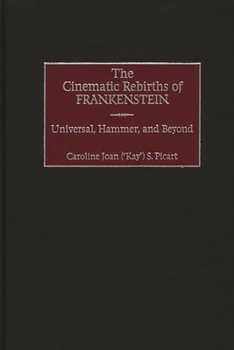The Cinematic Rebirths of Frankenstein: Universal, Hammer, and Beyond
The Frankenstein narrative is one of cinema's most durable, and it is often utilized by the studio system and the most renegade independents alike to reveal our deepest aspirations and greatest anxieties. The films have concerned themselves with demarcations of gender, race, and technology, and this new study aims to critique the more traditional interpretations of both the narrative and its sustained popularity. From James Whale's Frankenstein (1931) through Kenneth Branagh's Mary Shelley's Frankenstein (1994), the story remains a nuanced and ultimately ambivalent one and is discussed here in all of its myriad terms: aesthetic, cultural, psychological, and mythic.
Beginning with an examination of the narrative's origins in the myth of the birth of Dionysus from the thigh of Zeus, The Cinematic Rebirths of Frankenstein goes on to consider each of the film's many incarnations, from the Universal horror films of the thirties through the British Hammer series and beyond. Moving easily between the scholarly and the popular, the book employs both primary texts-including scripts, posters, and documentation of production histories-and a rigorous, scholarly examination of the many implications of this often-misunderstood subgenre of horror cinema.Format:Hardcover
Language:English
ISBN:0275973638
ISBN13:9780275973636
Release Date:October 2001
Publisher:Praeger
Length:240 Pages
Weight:1.09 lbs.
Dimensions:0.9" x 6.3" x 9.5"
Related Subjects
Arts, Music & Photography Language Arts Performing Arts Social Science Social SciencesCustomer Reviews
0 rating





